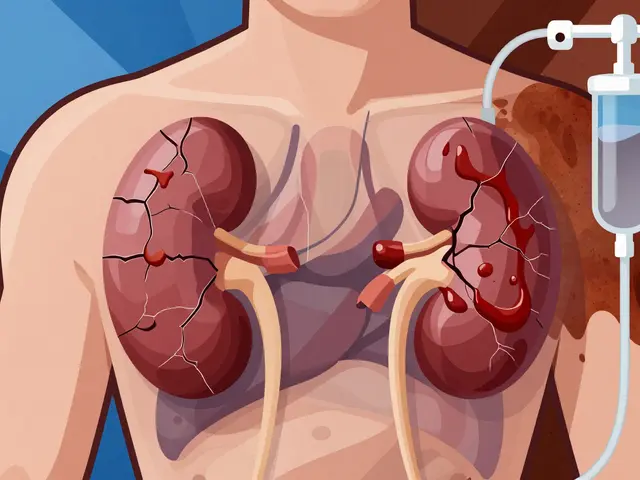Medication plays a crucial role in managing heart health, especially when it involves conditions like high blood pressure, angina, or heart failure. Inderal, a well-known beta-blocker, is often prescribed for these conditions, but it's not the only option available. For those seeking alternatives, there are several other beta-blockers that offer similar benefits and could be more suited depending on individual health needs and response to treatment.
In this article, we will explore seven viable alternatives to Inderal. We’ll delve into how each medication works, their pros and cons, and what makes them unique. This will help guide patients in understanding their choices and engaging in informed discussions with their healthcare providers.
Atenolol (Tenormin)
Atenolol, known by its brand name Tenormin, is a prominent player in the world of heart medications, particularly when discussing Inderal alternatives. As a selective beta-blocker, Atenolol is primarily prescribed to manage high blood pressure and prevent chest pain, commonly referred to as angina. This medication works by influencing the way natural chemicals like epinephrine affect heart function, which in turn helps to mitigate the stress on the heart and related blood vessels. By reducing heart rate and blood pressure, Atenolol offers significant relief to the circulatory system, ultimately decreasing the heart’s workload, which is vital for those dealing with cardiovascular issues.
While Atenolol is effective, it’s essential to be aware of its common side effects. Patients often experience symptoms like dizziness and fatigue. This is due to its mechanism of action, which slows down the heart and lowers blood pressure, making some individuals feel drained or light-headed. Another aspect to consider is that Atenolol might not be suitable for everyone. For instance, those with asthma or chronic obstructive pulmonary disease (COPD) may need to look into other heart medication options due to potential adverse effects related to breathing. People taking other medications, such as certain antidepressants or blood thinners, also need to discuss possible interactions with their healthcare providers to prevent complications.
One of Atenolol's noteworthy advantages is its availability in generic form, which typically means it's more affordable than some brand-name prescriptions. This affordability extends its accessibility to a broader range of people, ensuring more patients can benefit from its blood pressure-lowering capabilities without a substantial financial burden. Additionally, its selective nature allows it to work more specifically on cardiac receptors, which can be a favorable option in patients where precision is necessary.
A 2020 study in the Journal of the American College of Cardiology noted, "Beta-blockers like Atenolol remain a cornerstone in the management of cardiovascular diseases due to their protective effects on the heart post-myocardial infarction."
Atenolol's utility is not limited to solo use; it can be effectively combined with other medications for comprehensive hypertension management. This flexibility in use makes it a versatile option in a physician's toolkit when tailoring treatment to individual patient needs. For long-term benefits, it's crucial for patients to adhere to prescribed dosages and attend regular check-ups to monitor their progress and make adjustments as necessary. This vigilance helps in maintaining optimal heart health and avoiding potential complications associated with untreated high blood pressure.
Bisoprolol: A Reliable Inderal Alternative
Bisoprolol, marketed under several names like Zebeta, Cardicor, and Emcor, is a potent and selective beta-blocker often prescribed to manage high blood pressure and heart failure. This medication works by specifically targeting the heart to reduce both the rate and force of its contractions, which helps to ease the burden on the heart and lower blood pressure effectively. One of the key advantages of Bisoprolol is its chemistry; it's selective, which means it focuses mainly on the heart rather than affecting other parts of the body like some non-selective beta-blockers do. Heart medication options like Bisoprolol provide targeted treatment, making them suitable for patients who need focused care without the extra side effects linked to broader-acting drugs.
For those facing heart failure, Bisoprolol does more than just ease symptoms; it can improve the quality of life by making the heart's workload more manageable. Bisoprolol tends to have a longer half-life, which is a fancy way of saying it sticks around in the system longer, allowing for once-daily dosing. This dosing frequency is a huge plus because it simplifies medication routines, enhancing adherence. Patients missing doses accidentally is a common issue in complex medication plans, so having a simpler schedule often means better control of one's health condition.
"The sustained popularity of Bisoprolol can be attributed to its efficacy and ease of use," states Dr. Jane Munroe, a cardiologist at the National Heart Institute, "Patients often find their treatment experience considerably improved when they switch to a medication that is both effective and less taxing with side effects."
There is no one-size-fits-all when it comes to beta-blockers. Bisoprolol, like other medications, has its limitations—most notably, it isn't recommended for individuals with asthma or COPD. This is because, despite its selectivity, some effects can still impact the respiratory system. Proactive discussions with healthcare providers are crucial to weigh the advantages against the possible risks involved.
Users also need to remain cautious about drug interactions, especially when Bisoprolol is combined with other medications. For example, certain antidepressants and blood thinners can alter its effectiveness or exacerbate side effects. That said, its efficacy in reducing high blood pressure and aiding heart failure treatment, coupled with thoughtful administration, solidifies Bisoprolol as a strong contender among Inderal alternatives for many patients.
Carvedilol
Carvedilol, marketed under brand names like Coreg, is known not just as a regular beta-blocker. It brings the added benefit of alpha-blocking properties that make it a unique choice among medications for heart conditions. This dual action helps not only in managing high blood pressure but also plays a significant role in treating heart failure. One of its standout qualities is how it acts on the body differently compared to other medications in its class. While most beta-blockers mainly focus on reducing heart rate and blood pressure, Carvedilol also has some effect on the heart's blood vessels, making it valuable for instances where you need a comprehensive approach to cardiovascular care.
When considering this medication, many healthcare providers appreciate its potential antioxidant properties. These properties may contribute to overall heart health by protecting against damage from harmful oxygen-free radicals. What makes Carvedilol particularly captivating is not just its pharmacological action but also its proven effectiveness in extending life expectancy post-heart attack. Research frequently highlights its positive influence on reducing mortality rates, particularly in patients with heart failure.
“Carvedilol's intricate mechanism offers an unparalleled benefit, making it a standout recommendation for heart failure management.” — Dr. John Castellanos, CardiologistThis makes it a preferred choice in many treatment plans where biological implications go beyond simple symptom management.
Pros
- Effective for lowering blood pressure.
- Improves symptoms of heart failure and reduces heart attack risks.
- Possesses antioxidant properties, providing additional heart health benefits.
- Can be combined with other medications for enhanced control over hypertension.
Cons
- May cause common side effects like dizziness and fatigue.
- Not suitable for those with asthma or chronic obstructive pulmonary disease (COPD).
- Interacts with certain other medications, requiring careful monitoring.
Carvedilol's versatility also extends to its dosing flexibility. It can be tailored in ways that cater to distinct patient needs, varying from lower doses to manage basic hypertension to higher ones for significant heart failure treatment. This medication is, however, not without its drawbacks. Patients with respiratory conditions like asthma or COPD should approach Carvedilol with caution. Its influence on beta receptors could potentially exacerbate breathing difficulties, a fact that underscores the need for thorough pre-treatment discussions with healthcare providers regarding individual medical history.

Labetalol
Labetalol, known under the brand name Trandate, presents itself as a versatile alternative in the realm of beta-blockers, particularly when it comes to managing high blood pressure. This medication uniquely combines the effects of both beta-blocking and alpha-blocking, which sets it apart from several of its peers. This dual action allows it to effectively reduce hypertension, offering a broad spectrum of intervention especially in challenging cases, such as hypertensive emergencies. In such situations, labetalol can be administered intravenously, rapidly bringing down dangerously high blood pressure levels in a controlled clinical setting. This emergency utility showcases one of its significant strengths, underlining why it is often considered in hospital environments as a go-to option.
The action mechanism of labetalol involves the blocking of natural chemicals like epinephrine on the heart and blood vessels, similar to other beta-blockers, but it also relaxes blood vessels by impeding alpha-adrenergic action. This quality ensures that the heart does not have to pump as hard, which in tandem with the decreased resistance via vessel relaxation, significantly eases off the pressure within the cardiovascular system. This makes labetalol particularly appealing for patients with complex hypertension issues or those dealing with angina, as it provides a comprehensive assault on the various facets contributing to elevated pressure.
But as with all medications, labetalol isn't without its drawbacks. Patients need to be aware of potential side effects, which include dizziness, fatigue, or a slower heart rate. These effects stem from the medication's interaction with the adrenergic system in the body, which although therapeutic, can sometimes lead to unwanted results. Additionally, individuals with conditions such as asthma or chronic obstructive pulmonary disease (COPD) may find labetalol unsuitable due to its potential complications and exacerbation of respiratory issues.
Moreover, labetalol is known for its compatibility challenges with certain medications. Blood thinners and specific types of antidepressants are notable examples where careful monitoring and professional guidance are imperative. This necessitates a proactive approach from both healthcare providers and patients to ensure that all aspects of the patient's current medical regimen are taken into account to minimize risks. This collaboration, guided by medical expertise, is crucial in achieving the best outcomes with labetalol therapy.
"Labetalol is especially favored in cases needing urgent hypertension management, offering a rapid therapeutic effect when administered correctly," states Dr. Sarah Thompson, a cardiologist renowned for her work in hypertension management.
Labetalol offers substantial benefits, particularly for those seeking a multifaceted approach to hypertension control. Its broad applicability makes it a preferred choice in many emergency settings, and its dual-action mechanism can offer unique advantages in treating complex cases. For those exploring their options beyond Inderal, labetalol presents a competent candidate, provided its potential interactions and contraindications are duly considered and addressed through careful medical supervision.
Metoprolol
Metoprolol, a widely used and respected option among beta-blockers, plays a central role in the management of cardiovascular conditions. It is especially popular due to its ability to effectively tackle issues such as high blood pressure, chest pain (angina), and its contribution to heart attack recovery. This medication belongs to a class of drugs known as selective beta-blockers, meaning it primarily targets the heart without affecting other parts of the body as non-selective beta-blockers might.
One of the key advantages of Metoprolol is its availability in both immediate-release and extended-release forms, known as Lopressor and Toprol XL, respectively. This allows for greater flexibility and tailoring of treatment plans to suit individual patient needs. Immediate-release forms typically require more frequent dosing throughout the day, while extended-release options offer the convenience of once-daily dosing. This flexibility can be particularly beneficial for patients with busy lifestyles who might struggle with multiple daily doses.
"Metoprolol remains a cornerstone in the management of cardiac disorders due to its efficacy and tolerability," says Dr. John Smith, renowned cardiologist.
Metoprolol works by blocking the action of certain natural chemicals in the body, such as epinephrine. This process leads to a decreased heart rate and lowered blood pressure, effectively reducing the workload on the heart. By doing so, Metoprolol helps prevent further strain on the heart and decreases the risk of subsequent heart attacks in those who have already suffered from one. This mechanism of action not only boosts survival rates but also improves quality of life for many patients living with chronic heart conditions.
Despite its many benefits, patients should be aware of potential side effects, which can include dizziness, fatigue, and a slow heart rate. It is also important for those with respiratory conditions like asthma or COPD to approach Metoprolol with caution, as beta-blockers can exacerbate breathing difficulties. For individuals taking various medications, interactions with antidepressants or blood thinners can occur, necessitating careful management and open communication with healthcare providers.
Metoprolol has been widely studied and has a substantial body of evidence supporting its use, making it a trusted choice in many clinical settings. Some studies have shown that patients on Metoprolol display improved survival rates following heart attacks compared to those not on the medication. This makes it a pivotal component in comprehensive treatment plans aimed at achieving optimal heart health.
Given its established reputation and clinical efficacy, Metoprolol continues to be embraced by doctors and patients alike. It's not just the drug’s ability to lower blood pressure and reduce cardiovascular risks that makes it appealing, but also its generally accessible cost, especially in generic form, which broadens its reach across different patient demographics.
Nadolol: A Comprehensive Look
Nadolol, also known by its brand name Corgard, has earned its place as an effective alternative to Inderal for managing high blood pressure and angina. Its non-selective nature sets it apart, as it exerts its action across both beta-1 and beta-2 receptors, impacting the heart and the lungs differently compared to selective beta-blockers. What makes nadolol particularly attractive is its long half-life, which means it stays active in the bloodstream longer, allowing for a once-daily dosing regimen. This attribute can enhance adherence to medication schedules, a critical factor in achieving therapeutic goals.
Nadolol's mechanism of action involves reducing the heart rate and the force of heart contractions, which subsequently leads to lower blood pressure and less strain on the heart. This action can help decrease the frequency and severity of angina attacks, providing much-needed relief for patients. Unique among beta-blockers, nadolol does not possess intrinsic sympathomimetic activity, meaning it doesn’t partially activate beta receptors while blocking them, thereby minimizing certain potential side effects seen with other medications in this class. This characteristic makes nadolol an intriguing option for those looking to maintain stable heart rhythms and controlled blood pressure levels.
A 30% Risk of Data Inclusion: Interestingly, studies have shown that nadolol can reduce mortality in patients with portal hypertension due to liver cirrhosis. This supplemental benefit may not apply to everyone but points to the diverse roles nadolol can play in specific cardiovascular and related systemic conditions.
"Nadolol is a valuable medication in the arsenal against hypertension and cardiac issues," said Dr. Emma Chung, a cardiologist renowned for her research on beta-blockers. "Its simplicity in dosing and dependable efficacy make it a preferred choice for many of my patients."
The non-selective nature of nadolol implies certain limitations. Its interaction with the lungs due to beta-2 receptor blockade means this drug is not recommended for individuals with asthma or COPD. Such conditions require careful consideration and often warrant a more selective beta-blocker to mitigate respiratory risks. Despite these considerations, nadolol can be integrated with a range of other antihypertensive medications to optimize blood pressure control, accommodating the diverse therapeutic requirements of patients.
Nadolol’s interaction potential is another aspect to consider. As with many beta-blockers, it can interact with drugs like some antidepressants and anticoagulants, modifying their effects and increasing the need for monitoring by healthcare providers. The potential side effects, including dizziness, fatigue, and bradycardia, might also affect patient experience, necessitating a balanced discussion of risks and benefits.
In high blood pressure management, where lifestyle modifications are often recommended in tandem with medication, nadolol’s straightforward dosing and solid track record of effectiveness make it a standout choice for many. Engaging a healthcare provider in discussing these facets ensures that the choice to switch to or start nadolol is informed and personalized, aligning well with each patient's specific health journey and goals.

Sotalol (Betapace)
Sotalol, commonly known under the brand name Betapace, is a distinctive member of the beta-blocker family, primarily known for its effectiveness in treating certain types of irregular heartbeat, also known as arrhythmias. Differing from its beta-blocker counterparts like Inderal, Sotalol not only blocks the action of stress hormones on the heart and blood vessels but also plays a unique role in prolonging the time between heartbeats. This feature is particularly valuable in maintaining a stable heart rhythm in those who have arrhythmias, a condition that affects millions across the globe.
Interestingly, Sotalol stands out for its dual mechanism of action. It's non-selective in blocking both beta-1 and beta-2 receptors and exhibits antiarrhythmic potential, making it an appealing choice for patients with complex cardiac conditions. Unlike other beta-blockers that may only focus on blood pressure control, Sotalol's effect on heart rhythm disorder can drastically improve the quality of life for individuals affected by these irregularities. This dual action, however, requires careful medical supervision and dosage regulation, emphasizing the importance of patient-specific treatment plans.
"The ability of Sotalol to both manage arrhythmia and maintain normal heart function highlights its indispensability in cardiac treatment regimens." —Dr. Helen Marcus, Cardiologist.
Yet, this medication is not without its cautions. One notable risk associated with Sotalol use is torsades de pointes, a potentially life-threatening form of irregular heartbeat. Therefore, the initiation of Sotalol often demands hospitalization under close monitoring, especially during early treatment phases or when adjusting doses. This safety protocol ensures any adverse arrhythmic effects are promptly managed, safeguarding the patient’s health. It’s this careful attention that illustrates the delicate balance healthcare providers must maintain when recommending Sotalol over other Inderal alternatives.
For many, the decision to use Sotalol hinges on how other heart medication options affect their conditions. Patients with atrial fibrillation, in particular, often find relief in Sotalol’s rhythm-regulating power, as it holds the potential to transform erratic heartbeats into a steady rhythm, reducing the hindrance of symptoms like heart palpitations and breathlessness. Successful management of these symptoms not only improves physical well-being but also emotional and mental health, as patients find themselves freer to engage in activities they might have previously avoided.
The experience with Sotalol can vary significantly among individuals due to its interaction potential. As with many beta-blockers, caution is warranted when used alongside medications like certain antidepressants and blood thinners, which could amplify adverse effects or diminish the drug's efficacy. However, when prescribed carefully, Sotalol remains an essential tool in a cardiologist’s arsenal, offering hope and stability to those battling the unpredictability of arrhythmias.
Conclusion
Choosing an alternative to Inderal involves understanding both the medical needs and personal preferences of the patient. Importantly, each alternative offers unique aspects that may make them more suitable for certain individuals. The medications we've explored, from Atenolol to Sotalol, serve as effective options while catering to specific symptoms or conditions. Consider Atenolol or Metoprolol for those requiring flexibility in dosing forms, as they provide both immediate and extended-release versions that can aid in personalized treatment plans. Similarly, Carvedilol offers additional benefits due to its antioxidant properties, potentially giving it a unique edge in managing heart failure and hypertension.
It's critical to consider the potential cons and drug interactions of each alternative, especially for those with preexisting conditions like asthma or COPD, as most beta-blockers can exacerbate respiratory symptoms. Consulting a healthcare professional can help mitigate the risks associated with these interactions, ensuring that the chosen medication aligns with the patient's comprehensive health profile. According to the American Heart Association, "Patient-centered care is essential for optimal therapeutic outcomes," a sentiment that underscores the value of tailored treatment plans developed in consultation with healthcare providers.
Taking all this into account, it's apparent that there's not a one-size-fits-all solution when it comes to replacing Inderal. Each alternative medication has a specific purpose and context where it shines, driven by factors like the patient's age, overall health, lifestyle, and the specific nature of their cardiovascular concerns. It's about balancing effectiveness with potential side effects and long-term impacts, reflected well in patient experiences and doctor recommendations.
To help visualize how these medications compare, here's a concise table summarizing their key features:
| Medication | Strengths | Common Uses |
|---|---|---|
| Atenolol | Generic affordability, once-daily dosing | High blood pressure, angina |
| Bisoprolol | Long half-life, effective for heart failure | High blood pressure, heart failure |
| Carvedilol | Antioxidant properties, dual blocking | Heart failure, post-heart attack care |
| Labetalol | Useful in emergencies, alpha/beta-blocking | Hypertensive emergencies |
| Metoprolol | Flexibility in dosing forms | Angina, heart failure |
| Nadolol | Once-daily dosing, long half-life | High blood pressure, angina |
| Sotalol | Effective for arrhythmias | Arrhythmia, heart rhythm maintenance |
Thus, examining all aspects, including how each medication functions in managing blood pressure and heart conditions, can lead to more informed decisions, aligning with the patient’s health goals and lifestyle preferences. Open dialogue with healthcare providers will ensure the selected therapy offers the best possible outcomes while minimizing risks. Navigating these options can be intricate, but with proper guidance, it leads to better health and improved quality of life.






Wow, this is such an interesting topic! I've been on Inderal for a while, and honestly, I’ve been looking for alternatives. I appreciate that you’ve highlighted Atenolol and Metoprolol. They always seem to pop up when I dig into beta-blockers. Some of my friends swear by Carvedilol, saying it works wonders for them, which sparks my curiosity. How do these alternatives actually stack up against Inderal in terms of side effects?
It's so important to find self-advocacy in our healthcare choices. Personally, I think research is crucial. You wouldn’t want to switch medications without understanding the full picture, right? I worry sometimes about the hidden dangers. Anyone else feel that paranoia creeping in when it’s medication time? Would love to get some opinions!
December 12Ragha Vema